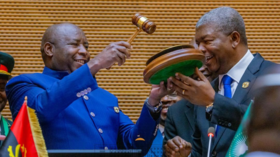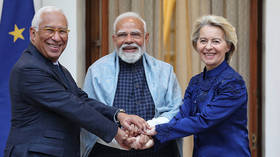US-Philippine drills ‘obviously a provocation’
Joint US-Philippine military drills have kicked off in the South China Sea, near an island claimed by both the Philippines and China. The controversial exercises are seen by many as a provocation that could lead to a real military conflict.
Last week China announced that the drills in the area would raise the risk of confrontation. The southwestern island of Palawan is situated in energy-rich waters said to hold extensive gas and oil reserves.China has claims to waters near the western edge of Palawan, as well as nearly the entire South China Sea. China has territorial disputes in the area with Indonesia, Taiwan, The Philippines, Vietnam and Brunei. The US said the location of the annual exercises with Philippine troops is “irrelevant,” and that China should not worry."These exercises take place on a regular basis. This year it happens to be in Palawan. The planning for this took place months ago, prior to any events that are currently in the headlines," Ensign Bryan Mitchell, spokesman for the US Marines, said at a press conference Wednesday. But Asia Times correspondent Pepe Escobar asserts that the drills are “obviously a provocation.”RT: Last week, China warned the drills would raise the risk of a military confrontation – how likely is that?Pepe Escobar: The US will never relinquish their bases from the Middle East to Central Asia, what the Pentagon used to call the "arch of instability."Hillary Clinton published an article in November of last year referring to “America's Pacific century,” which is not the last one – it is actually the 21st. It is concerning the White House, State Department, CIA and Pentagon agenda – and the agenda is confrontational and militaristic.This pivoting from the Middle East to Asia includes more troops in Australia… probably another base in the Philippines in the short term, inciting animosity especially between the Philippines and Vietnam and China. And the leadership in Beijing, they can see through it and they already anticipate it.In fact, ten years ago during 9/11, the Chinese saw that they had a window of opportunity of twenty years to concentrate on internal development without any provocation from the West; this window will be gone in ten years.This pivoting also means that Al Qaeda – that ghost that never existed – is now completely over, so Obama put America in a psychical analytic divan and said, "your trauma is over, now let's concentrate on our competitor." And our biggest competitor is China.The problem is that instead of devising a strategy of non-confrontation, Obama goes to the Pentagon and he launches a military confrontation in slow motion.RT: Do you think the US will remain a white knight if a military confrontation does start?PE: They are not crazy enough to start a war, what they want to do is to keep provoking China, because the South China Sea is not only of national strategic interest to China but is also a very important gas and oil tanker route.So everything that includes the Arabian Sea, the South China Sea and the Western Pacific, which China sees as immediate area of influence and midterm area of influence, the US navy is going to be there and they will be looking for trouble.RT: So what is the next move? What can happen to make all of this go away?PE: If we stick to the facts on the ground, there are possibilities of a spark turning into something much more complicated, in myriad areas: the Yellow Sea; you have those troops still in South Korea; you have the American troops still in Japan; you have American troops in Australia. So it is part of the move towards a multipolar world that is being contested by Washington almost in a blank fury, because they don't have the intellectual equipment to try to reorganize themselves to be one power among many other regional powers.And from the Pentagon point of view, don't forget that the official doctrine in Washington is the Pentagon doctrine, called “full spectrum dominance.” Many people think that we made that up, but it's in the 2002 National Security Strategy. It includes full domain of air, land, sea, cyberspace and outer space.














